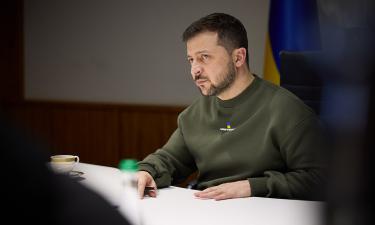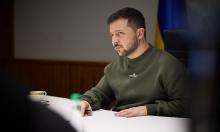Russia: renovationist Communists trying to become social democrats
Defeated at the last parliamentary and presidential elections in Russia, Communists are trying to cement their disorganised ranks and for the first time in their history to change their leader - Gennady Zyuganov - in a democratic way.
Until now a Communist leader in Russia has been replaced only by three methods. As a rule, this was a purely physiological process: a leader lived as long as he could and then died. Critically ill Brezhnev, Andropov and Chernenko did not leave their posts until their last gasp, let alone such figures as Lenin and Stalin. There was a time when a leader was changed as a result of a coup: in that way the party got rid of Khrushchev. And lastly, one day in August 1991, following an abortive anti-perestroika putsch, Gorbachev resigned as general secretary on his own initiative, disappointed in his own party.
On the day before Moscow provided the venue for two plenums of the central committee of the Russian Communist Party. A plenum of "renovators", which according to their own information was attended by 96 central committee members out of 158, kicked Zyuganov out and temporarily appointed to that post (pending the next party congress) Vladimir Tikhonov, incumbent governor of the Ivanovo region. The plenum of the orthodox Communists in its turn left Zyuganov at the head of the party and expelled rebels from among the "true Communists". Which of the forums will prove "legal" and which not, will be shown by time. The legal plenum will, naturally, be one which will win out in the end.
However, the schism has progressed so far, and the desire to command the left protectorate in Russia has become so strong, that party twins are likely to be born. If this happens, the twins will hardly look alike. The replacement of Zyuganov conceals a desire not only to renovate the party facade and to replace the failed leader, who moreover discredited himself in the eyes of many rank and file KPRF members by financial ties with Russia's oligarchs, but also a desire to somehow modernise the party's ideological base, bringing it, at least by half a step, to European Social Democracy.
If this really happens, then the "renovators" have the chance to gain a firm foothold. The ideas of social justice in Russia are still strong. Besides, liberal reforms (necessary but undoubtedly painful) facing the country can only broaden the base of Social-Democrats. Communists as defenders of social interests of the people have already gone bankrupt. But Social Democracy may have a future in Russia.
© &to=http://www.rian.ru' target=_blank>RIAN
Early reports by "PRAVDA.Ru":
Subscribe to Pravda.Ru Telegram channel, Facebook, RSS!





